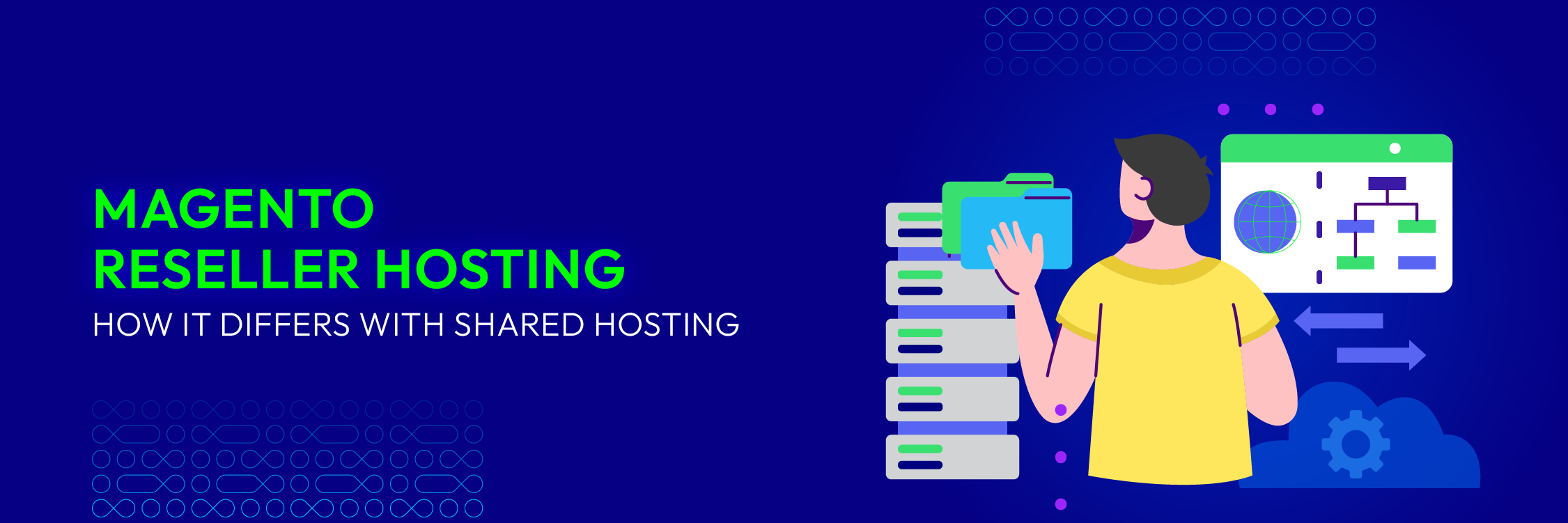Hyvä Theme is Now Open Source: What This Means for Magento Community - Mageplaza
Hyvä is now Open Source and free. Discover what changed, what remains commercial, how it impacts the Magento ecosystem, and how to maximize its full potential.

Magento reseller hosting lets entrepreneurs offer hosting services under their own brand by purchasing bulk plans from a primary provider. This customizable service scales operations and boosts client engagement with tailored solutions for Magento eCommerce platforms. We’ll examine its unique features compared to shared hosting, highlighting its customization options, scalability, and security measures.

Magento reseller hosting enables entrepreneurs to acquire hosting services in large quantities from a primary provider. Subsequently, they can market these services under their own brand. This option is tailored for individuals seeking to provide Magento eCommerce hosting solutions to their clientele.
Magento Reseller Hosting operates through a collaborative arrangement between the reseller and the primary hosting provider. This partnership enables the reseller to deliver tailored hosting solutions to their clientele. Here’s how Magento Reseller Hosting works:
Bulk Hosting Plan Purchase: Resellers procure hosting plans in bulk from the primary provider. These plans come with predetermined resources that can be distributed among multiple clients.
Customization and Branding: Resellers have the flexibility to customize hosting packages to suit their clients’ specific needs. They can incorporate branding elements into control panels and customer communications to maintain a consistent business identity.
Resource Allocation: Resellers divide the bulk resources into smaller packages and allocate them to clients based on their individual Magento requirements.
Client Account Setup: Resellers establish hosting accounts for their clients and manage them using a reseller control panel provided by the hosting provider.
Pricing and Billing: Resellers determine the pricing for their hosting services and handle billing directly with their clients.
Client Support: Resellers serve as the initial point of contact for their clients’ support needs. They address basic inquiries and issues themselves and escalate more complex issues to the primary hosting provider’s support team.
Maintenance and Upgrades: The primary hosting provider is responsible for server maintenance, updates, and security. Resellers ensure their clients’ hosting environments are optimized and operating smoothly.

Tailored Solutions and Adaptability
Revenue Generation Opportunities
Branding and Client Engagement
Scalability and Flexibility
Technical Assistance
Initial Financial Commitment
Requires an upfront investment to acquire the reseller package, potentially involving additional expenses for marketing and client acquisition.
Support Responsibilities
Assumes responsibility as the primary point of contact for addressing clients’ support inquiries, which can consume time and demand technical expertise.
Reliance on Provider
Service quality hinges on the reliability and performance of the primary hosting provider. Any downtime or issues on their part can directly impact your clients.
Competitive Landscape
Operates in a fiercely competitive hosting market with numerous options available to end-users, making it challenging to differentiate your service and demonstrate value.
Technical Constraints
May encounter limitations in server management and configuration, subject to the capabilities and constraints of the primary provider’s platform.
Integrated Services Offering: Consultants can bundle hosting with their consultancy services, presenting a comprehensive solution for clients.
Enhanced Performance and Security: Consultants ensure optimized Magento hosting for their clients, enhancing site performance and security, tailored for eCommerce needs.
Selecting the appropriate hosting solution for a Magento website necessitates weighing factors such as performance, scalability, security, customization, and cost. Here’s a comparison of Magento Reseller Hosting with Shared Hosting concerning these critical elements:
Shared Hosting: Restricted by shared resources: Websites hosted on shared servers share resources, potentially resulting in slower response times and diminished performance during periods of high traffic. This configuration might not be ideal for a Magento store experiencing substantial traffic or for a Magento hosting provider aiming to deliver optimal performance.
Magento Reseller Hosting: Enhanced by dedicated resources: Provides dedicated resources for each Magento website, guaranteeing increased reliability and quicker loading times. This setup is advantageous for businesses prioritizing the performance of their Magento hosting plan and is particularly suited for those seeking the ultimate Magento hosting solution.
Shared Hosting: Restricted scalability options: Expanding resources to handle sudden increases in traffic can pose challenges on a shared server, potentially hindering the growth potential of Magento websites.
Magento Reseller Hosting: Simple resource scalability: Magento Reseller Hosting facilitates effortless adjustments to resources such as bandwidth and storage, making it well-suited for Magento hosting providers supporting the rapid expansion of Magento stores.

Shared Hosting:
Foundational security features: Typically includes standard security protocols, which may not meet the stringent security needs of Magento websites. While shared hosting often includes a complimentary SSL certificate, it may lack advanced security functionalities.
Magento Reseller Hosting:
Sophisticated security capabilities and tailored customization: Offers advanced security measures specifically designed for Magento hosting requirements. This encompasses customized firewalls and dedicated IP addresses, essential for safeguarding Magento stores that manage sensitive customer information.
Shared Hosting:
Restricted customization and control: Users typically have limited access to server configurations, impeding their ability to fully optimize a Magento website.
Magento Reseller Hosting:
Extensive customization and control: Offers a high level of flexibility in customizing the hosting environment, allowing users to tailor server configurations and software installations to suit the specific needs of Magento sites. Managed Magento web hosting services should prioritize delivering optimized solutions.
Shared Hosting:
Lower initial investment: Typically presents a budget-friendly option suitable for startups, small to medium-sized businesses (SMBs), and newly established websites. It proves appealing for new Magento stores or entities operating with constrained budgets.
Magento Reseller Hosting:
Higher initial investment but enhanced features and capabilities: Although entailing a higher upfront cost, Magento Reseller Hosting delivers superior value. It caters to Magento hosting providers and businesses seeking advanced functionalities, including cloud hosting or virtual private server (VPS) options.
Shared Hosting:
Ideal for small websites with low traffic: Well-suited for new or smaller Magento sites, with the possibility of dedicated hosting options for larger-scale sites.
Magento Reseller Hosting:
Suited for growing businesses, web developers, and agencies: Ideal for efficiently managing multiple Magento sites, catering to scalability, security, and customization requirements. It accommodates diverse hosting needs, ranging from cloud hosting for Magento to specialized Managed Magento web hosting services.
1. How Can I Install the Magento eCommerce Platform?
To install the Magento eCommerce platform, ensure your hosting meets the requirements. Most managed Magento hosting providers offer one-click installation through their control panels. After purchasing a plan, you can typically find the installation option in your hosting account dashboard. Follow the steps, including setting up a database and configuring your admin account.
2. Who Are the Top Magento Hosting Providers?
Leading Magento hosting providers specialize in offering optimized environments specifically for Magento. Key players include companies that offer managed Magento hosting. They also provide Magento cloud hosting. Additionally, there are those with hosting platforms optimized for Magento. These providers ensure high performance and reliability and offer Magento-specific support.
3. What Does Managed Magento Hosting Involve?
Managed Magento hosting refers to a service where the hosting provider manages all the technical aspects of running Magento. This includes security, updates, backups, and performance optimization. This type of hosting is ideal for businesses without a technical team and who wish to focus on their store rather than server management.
4. Are Magento’s and Magento 2’s Hosting Requirements Different?
Yes, Adobe has updated Magento’s system requirements compared to its predecessor. Most noteworthy is its need for PHP 7.3 or later, additional extensions, and a supported database like MySQL 5.7. Magento hosting providers usually indicate if their hosting plans are compatible with Magento 2.
5. Can I Utilize Magento Cloud Hosting for a Small Web Hosting Plan?
Magento cloud hosting is typically scalable. It can suit various hosting needs, from small projects to large-scale enterprises. It offers flexibility in scaling resources according to traffic demands. This can be advantageous for eCommerce stores with fluctuating traffic levels. However, assess if the cost aligns with your budget. Cloud hosting can be pricier than traditional shared hosting.
6. How Should I Choose the Right Hosting Type for My Magento eCommerce Site?
When selecting hosting for a Magento eCommerce site, consider factors like site size, traffic, budget, and technical expertise. Shared hosting might suffice for new or small stores. Growing businesses may need the scalability and enhanced performance of cloud or VPS hosting. Companies with high traffic and specific performance needs should consider managed Magento cloud or dedicated Magento hosting. Opt for hosting optimized for Magento for the best performance and support.
In conclusion, Magento reseller hosting is advantageous for web agencies and freelancers aiming to offer complete eCommerce solutions. Key strategies for effective utilization include customizing hosting to fit each client’s needs, reselling under your brand for enhanced trust, setting pricing for steady income growth, scaling resources effortlessly, and mastering support with direct assistance backed by the hosting provider.